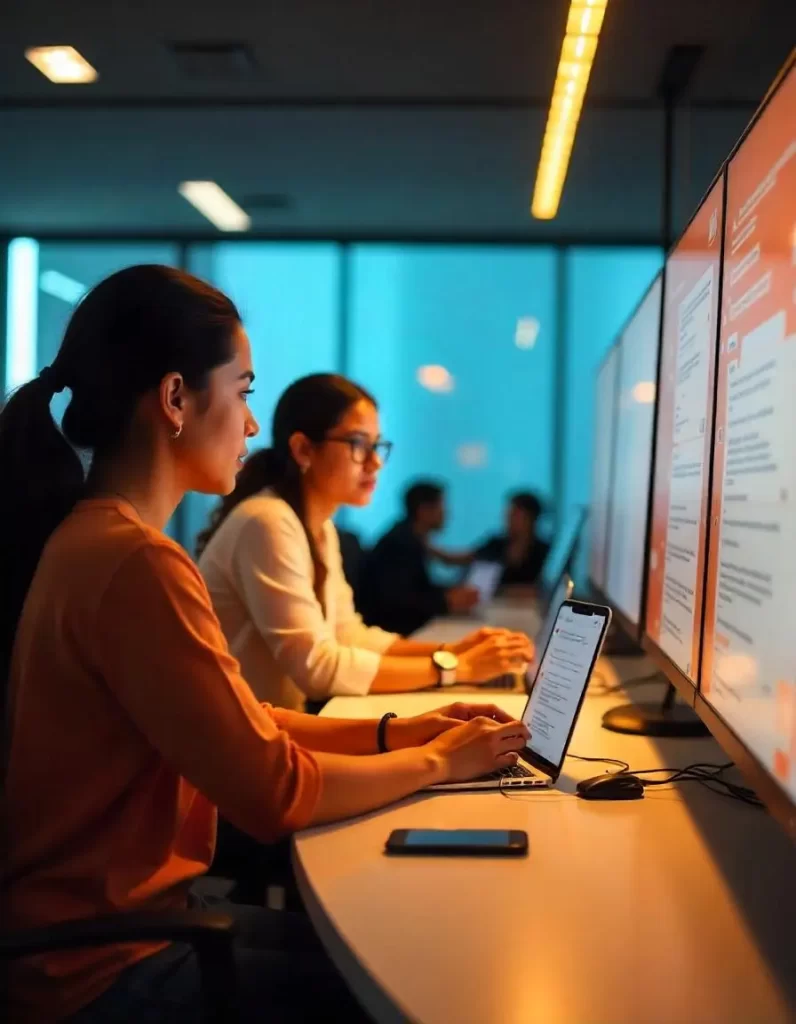Introduction
The landscape of civil engineering is evolving at lightning speed, thanks to Artificial Intelligence (AI). From smart infrastructure planning to real-time data analysis, AI is revolutionizing how we build cities and manage spaces.
But amid the digital transformation, one crucial question arises: Will human-designed spaces lose their significance in an AI-driven world? At MKCE Engineering College, we believe the future lies in the balance—between intelligent systems and the irreplaceable human touch in engineering.
This blog explores how AI is impacting civil engineering, the rise of smart cities, and why human-centered design remains at the heart of modern infrastructure. Plus, we’ll share how MKCE empowers students to navigate this exciting duality.
AI and Civil Engineering: A Transformational Union
AI is no longer a futuristic concept—it’s already making profound changes in how civil engineers plan, design, construct, and maintain infrastructure.
Key Applications of AI in Civil Engineering:
- Predictive Maintenance: AI algorithms analyze data from sensors embedded in bridges, roads, and buildings to detect potential failures before they happen.
- Urban Planning: Machine learning models optimize city layouts, traffic flow, and zoning using population and environmental data.
- Construction Automation: Robotics and AI streamline repetitive tasks on construction sites, increasing safety and efficiency.
- Disaster Risk Management: AI can predict natural disasters such as floods, landslides, or earthquakes based on historical and environmental data.
These innovations are at the core of smart city development, which aims to create sustainable, efficient, and data-driven urban spaces.

What Are Smart Cities?
A smart city integrates digital technology and intelligent systems into every layer of infrastructure—from transportation and energy grids to waste management and housing.
Features of Smart Cities:
- IoT-based infrastructure that gathers and shares real-time data
- Energy-efficient systems for lighting, heating, and cooling
- AI-powered traffic management and public transportation
- Automated waste collection and water usage monitoring
- Smart buildings that self-regulate energy consumption
Why AI is Central to Smart City Development
AI acts as the brain of a smart city. It processes data collected by sensors, makes decisions in real time, and learns to optimize operations over time. For example, AI can automatically reroute traffic to avoid congestion or adjust energy usage based on weather patterns.
This shift is revolutionizing the scope of civil engineering—making it more proactive, intelligent, and data-driven.

The Role of Human-Centered Design in Civil Engineering
While smart cities represent the future, human-designed spaces—parks, landmarks, pedestrian-friendly neighborhoods—still form the soul of our environments.
Why Human Design Still Matters:
- Cultural Relevance: Humans bring cultural, historical, and emotional context to urban spaces.
- Aesthetic Appeal: AI can optimize, but it can’t replicate the creative intuition of human architects and engineers.
- Social Well-being: Spaces designed with empathy foster connection, mental health, and a sense of belonging.
- Ethical Considerations: Human judgment ensures infrastructure is inclusive, ethical, and designed for all.
In short, while AI helps build smart cities, it’s humans who ensure they remain livable and meaningful.

The Balance: AI + Human Ingenuity = Future-Proof Infrastructure
The future of civil engineering isn’t about choosing between AI and human design—it’s about synergy.
What Future Engineers Need to Master:
- AI and data science fundamentals for infrastructure analysis
- Software tools like AutoCAD, BIM, and GIS
- Environmental and sustainability practices
- Design thinking and user-centric planning
- Communication and ethical decision-making
That’s where MKCE Engineering College plays a vital role.
MKCE: Shaping Future-Ready Civil Engineers
At MKCE (M.Kumarasamy College of Engineering), we understand the dual needs of the modern civil engineering student—technological fluency and creative, human-centered thinking.
How MKCE Prepares You for the Future of Civil Engineering:
1. Cutting-Edge Curriculum
Our civil engineering programs are infused with AI-related electives, including:
- Smart Infrastructure
- AI in Urban Planning
- Environmental Data Analysis
2. State-of-the-Art Labs
Students access modern labs equipped with:
- IoT simulation tools
- AI-integrated design software
- Environmental monitoring systems
3. Industry Partnerships
Through internships and live projects with construction and smart city firms, students get real-world exposure.
4. Interdisciplinary Learning
We encourage collaboration between civil, computer science, and electrical engineering departments to foster AI-based innovation.
5. Focus on Soft Skills
From public speaking to ethical design principles, we train our students to be thoughtful, well-rounded professionals.
Real-World Careers: Where AI and Civil Engineering Meet
The rise of AI is opening up exciting new career paths for civil engineers:
- Smart City Consultant
- Infrastructure Data Analyst
- AI-enabled Structural Designer
- Construction Automation Specialist
- Urban Systems Planner
With the right education, civil engineers can lead the future of smart, sustainable, and human-centered cities.
Building Smarter Cities with Smarter Minds
The civil engineer of tomorrow must be a technologist, a designer, a planner, and above all, a humanist.
AI is not here to replace the civil engineer—it’s here to empower them. With the right tools and mindset, engineers can create spaces that are not just smart, but soulful, inclusive, and future-ready.
At MKCE Engineering College, we are proud to nurture engineers who blend innovation with compassion, and data with design.
Want to Be Part of the Future?
Explore the Civil Engineering program at MKCE and join a community that’s building tomorrow’s cities—brick by brick, byte by byte.
Visit www.mkce.ac.in to learn more
- AI in civil engineering
- smart cities and AI
- future of civil engineering
- civil engineering education
- civil engineering and artificial intelligence
- civil engineering innovations